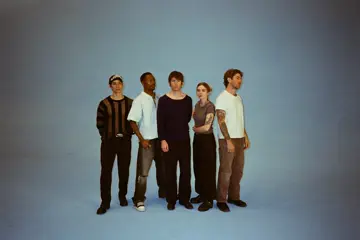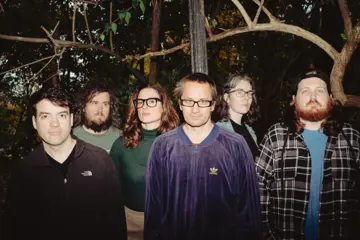
Walking in, glow sticks are handed to the audience in lieu of the customary ticket stub. Worksite partitions covered in spray-painted slogans (Iggy/Welcome To Mother Superior's/No Poll Tax/Ali is a slag) cut off the stage area. Behind them there's some serious doofing going on and instead of the usual pre-show calm in the auditorium, there's an old school warehouse rave in full tilt, complete with Adidas trackies, smoke machines, tank tops, strobes, washed-out mum jeans, Skitzmix and spiked blonde hair.
The players use the audience like props; skolling people's beers then throwing arms 'round shoulders hugging them close with chemically fuelled bonhomie to slur bullshit stories - each every inch as enthusiastic and unselfconscious as someone with a head full of speed and a gut full of bevvys. It's enough to cause serious flashbacks and a few people in the crowd even jump up to shuffle with a glow-stick in each hand.
Once the dry ice has cleared, the characters fill us in on life in '80s Edinburgh through a series of short vignettes that play out like bar stories; trying to pick up a couple girls at a Hibs match, having an argument down the pub, getting your down-and-out mate hooked on heroin. Like the film (its director, Danny Boyle, was inspired to make a cinematic adaptation of Irvine Welsh's book after seeing the stage version more than two decades ago) and the novel they range from laugh out loud to heartbreaking to deeply unsettling and individually they're each excellent. Taken all together in quick succession, the lines start to bleed together and the play seems to exist lodged somewhere in between Welsh's non-linear writing and Boyles' more defined narrative.
That's not to say Trainspotting isn't powerful viewing, but between the frenetic pace and near-constant narration the characters start to suffer from a lack of quiet moments. The actors themselves seem custom-built to inhabit their roles (Chris Dennis as Begbie is a particularly vicious highlight/lowlife), but without the odd moment to process each hit and tragic pass you slowly become a little numb to the furore.
Don't miss a beat with our FREE daily newsletter












